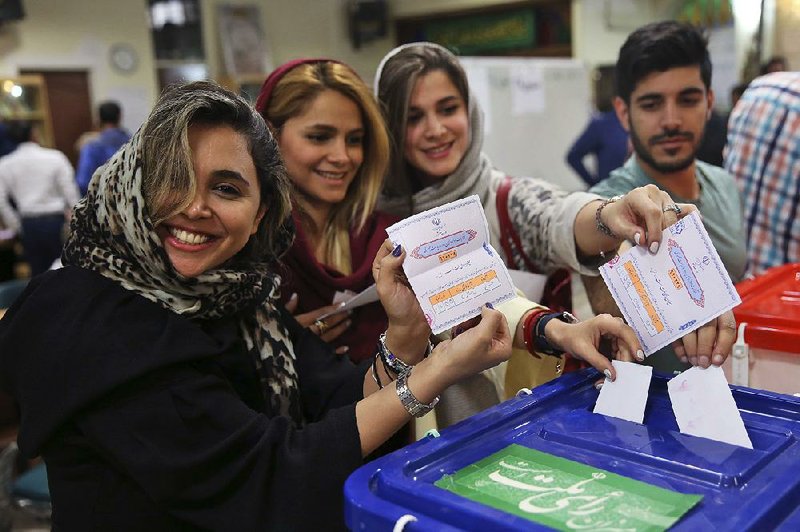TEHRAN, Iran -- Millions of Iranians voted late into the night Friday to decide whether incumbent President Hassan Rouhani deserves another four years in office after securing a landmark nuclear deal, or if the sluggish economy demands a new leader.
The Islamic Republic's first presidential election since the 2015 nuclear accord drew more than 40 million people, or about 70 percent of eligible voters, to polling stations, according to Ali Asghar Ahmadi, deputy interior minister. Election officials extended voting hours at least three times at the more than 63,000 polling places to accommodate the crowds.
Ahmadi said he hopes to have the results later today.
Four candidates remained in the race. But for most voters only two mattered, both of them clerics with very different views for the country's future: Rouhani and hard-line law professor and former prosecutor Ebrahim Raisi.
Rouhani is a political moderate by Iranian standards, but the 68-year-old has come to embody more liberal Iranians' hopes for greater political freedom at home and better relations with the outside world.
His supporters were also hoping he can make better progress on improving the economy, a key issue on the minds of the country's 56 million eligible voters. Many people say they are yet to see the benefits of the nuclear deal, which saw Iran limit its contested nuclear program over the objection of hard-liners in exchange for the lifting of some sanctions.
Supreme Leader Ayatollah Ali Khamenei, the most powerful man in Iran, cast the election's first vote. He called for a large turnout, saying "the country is in the hands of all people."
In Tehran, whose liberal and affluent voters form the bedrock of support for Rouhani, lines at some precincts were much longer than those in the 2013 election, which he won.
"I am happy I could vote for Rouhani," said Zohreh Amini, a 21-year-old woman studying painting at Tehran Azad University. "He kept the shadow of war far from our country."
Voters from the cities of Bandar Abbas, Hamadan, Isfahan, Rasht, Shiraz and Tabriz also described crowded polling places.
The turnout may have spooked Raisi's camp, which filed a complaint to authorities over what it called "election violations" even before the polls closed, according to a report by the semiofficial Tasnim news agency.
Tehran Friday prayer leader Ayatollah Mohammad Ali Movahedi Kermani urged voters to elect someone who won't be a "hostage" to Western governments and their culture.
"The next president should not be someone who makes the enemies happy when he is elected," said Kermani, an adviser to Khamenei.
Rouhani has history on his side in the election. No incumbent president has failed to win re-election since 1981, when Khamenei himself became president.
The 56-year-old Raisi, who heads a religious charitable foundation with vast business holdings, is seen by many as close to Khamenei. Raisi has even been discussed as a possible successor, though Khamenei has stopped short of endorsing anyone.
Raisi won the support of two major clerical bodies and promised to boost welfare payments to the poor. His populist posture and anti-corruption rhetoric -- bolstered by his alleged role condemning inmates to death during Iran's 1988 mass execution of thousands of political prisoners -- hold appeal for conservative rural and working-class voters.
"Rouhani has turned our foreign policies into a mess and damaged our religion," said Sedigheh Davoodabadi, a 59-year-old housewife in Iran's holy city of Qom who voted for Raisi. "Rouhani gave everything to the U.S. outright" in the nuclear deal.
Both candidates urged voters to respect the outcome of the vote.
Mostafa Hashemitaba, a pro-overhaul figure who previously ran for president in 2001, and Mostafa Mirsalim, a former culture minister, also remain in the race.
Iranians overseas also voted in more than 300 locations, including 55 in the U.S., where more than 1 million Iranians live.
Hard-liners remain suspicious of America, decades after the 1953 U.S.-engineered coup that toppled Iran's prime minister and the 1979 U.S. Embassy takeover and hostage crisis in Tehran. President Donald Trump's tougher stance on Iran has stoked concern as well, though his administration this week took a key step toward preserving the Obama-era nuclear deal by approving waivers outlined in the accord.
Iran's political system combines conservative clerical oversight and state control over large parts of the economy with tightly regulated but still hotly contested elections for key government posts.
All candidates for elected office must be vetted, a process that excludes anyone calling for radical change. No woman has ever been approved to run for president.
The president of the Islamic Republic oversees a vast state bureaucracy employing more than 2 million people, is charged with naming Cabinet members and other officials to key posts, and plays a significant role in shaping both domestic and foreign policy. But he remains subordinate to the supreme leader, who is chosen by a clerical panel and has the ultimate say over all matters of state.
Information for this article was contributed by Amir Vahdat, Iran, Ebrahim Noroozi and Jon Gambrell of The Associated Press.
A Section on 05/20/2017
